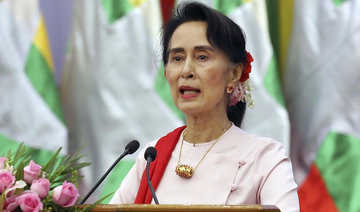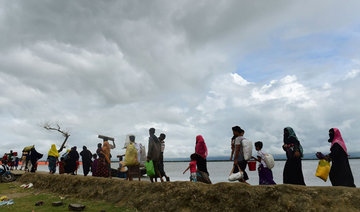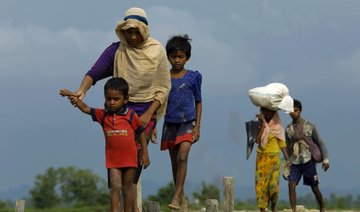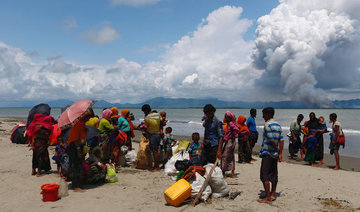UKHIA, BANGLADESH: The lost Rohingya boy made the journey from Myanmar alone, following strangers from other villages across rivers and jungle until they reached Bangladesh, where he had no family and no idea where to go.
“Some women in the group asked, ‘Where are your parents?’ I said I didn’t know where they were,” said Abdul Aziz, a 10-year-old whose name has been changed to protect his identity.
“A woman said, ‘We’ll look after you like our own child, come along’. After that I went with them.”
More than 1,100 Rohingya children fleeing violence in western Myanmar have arrived alone in Bangladesh since August 25, according to the latest UNICEF figures.
These solo children are at risk of sexual abuse, human trafficking and psychological trauma, the UN children’s agency said.
Many have seen family members brutally killed in village massacres in Rakhine state, where the Myanmar army and Buddhist mobs have been accused of crimes described by the UN rights chief as “ethnic cleansing.”
Others narrowly escaped with their own lives — some children arriving in Bangladesh bear shrapnel and bullet wounds.
The number of children who crossed into Bangladesh alone, or were split up from family along the way is expected to climb as more cases are discovered.
More than half of the 370,000 Rohingya Muslims who have made it to Bangladesh since August 25 are minors, according to UN estimates.
A sample of 128,000 new arrivals conducted in early September across five different camps, found 60 percent were children, including 12,000 under one year of age.
This presents a needle in a haystack scenario for child protection officers trying to find unaccompanied minors in sprawling refugee camps, where toddlers roam naked, children sleep outdoors and infants play alone in filthy water.
“This is a big concern. These children need extra support and help being reunited with family members,” Save the Children’s humanitarian expert George Graham said in a statement.
“At first they don’t talk, don’t eat, don’t play. They just sit still, staring a lot,” Moazzem Hossain, a project manager with Bangladeshi charity BRAC told AFP at a ‘child-friendly space’ run in partnership with UNICEF at Kutupalong refugee camp.
There are 41 of these safe zones across Bangladesh’s ever-expanding network of refugee camps.
Every day children, some carrying younger siblings, flock to the simple wooden huts for activities like singing, playing with toys and blocks and skipping ropes.
It is a welcome distraction from the misery outside, where monsoon rain turns the camp into a quagmire and exhausted refugees compete for dwindling food and space.
But playtime also allows staff to register details about a child’s background, monitor newcomers and keep an eye out for the tell-tale signs of a child on their own.
One such youngster was 12-year-old Mohammad Ramiz, who found himself alone after fleeing his village and tagged along with a group of adults.
“There was a lot of violence going on, so I crossed the river with others,” said Ramiz, not his real name.
“I ate leaves from the tree, and drank water to survive.”
There are fears the vulnerable minors could be exploited if left unsupervised in the camps, UNICEF Geneva spokesman Christophe Boulierac told AFP.
Girls are particularly at risk of being lured into child marriages, or trafficked to red-light districts in big cities where they are forced into prostitution and abused, he added.
But the facilities for refugee children are vastly overstretched.
Over just two days, 2,000 children came through a single ‘safe space’ in Kutupalong, little larger than a classroom with just a few staff on hand.
Thirty-five unaccompanied minors were identified over that period, Boulierac said, but more resources were needed to ensure others did not slip through the cracks.
“The faster we act, the more chance we have of finding their family,” he told AFP.
“The most important thing is to protect them because unaccompanied children, separated children, are particularly vulnerable and in danger.”
Hundreds of Rohingya children arrive in Bangladesh alone
Hundreds of Rohingya children arrive in Bangladesh alone
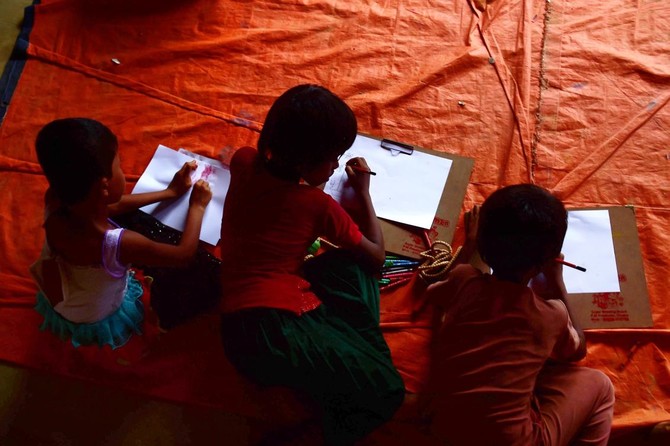
Poland shuts consulate in Saint Petersburg on Russian order

“The Polish Consulate General in Saint Petersburg was shut down upon Russia’s withdrawal of its consent to the activity of the Polish post,” Poland’s foreign ministry said
WARSAW: Poland announced Wednesday it had shut its consulate in the Russian city of Saint Petersburg, after Russia ordered the closure in a tit-for-tat move.
Russia ordered the closure in December after Poland said in October it was closing Russia’s consulate in the Polish city of Poznan, accusing Moscow of “sabotage” attempts in the country and its allies.
“The Polish Consulate General in Saint Petersburg was shut down upon Russia’s withdrawal of its consent to the activity of the Polish post,” Poland’s foreign ministry said in a statement Wednesday.
“It is in retaliation for a decision of the Polish foreign minister to close down Russia’s Consulate General in Poznan in the aftermath of acts of sabotage committed on Polish territory and linked to Russian authorities.”
After Russia ordered the closure, Poland responded that it would close all the Russian consulates on its soil if “terrorism” it blamed on Moscow carried on.
Tensions between Russia and NATO member Poland have escalated since Moscow sent troops into Ukraine in February 2022, with both sides expelling dozens of diplomats.
Poland is a staunch ally of Kyiv and has been a key transit point for Western arms heading to the embattled country since the conflict began.
In one of the largest espionage trials, Poland in 2023 convicted 14 citizens of Russia, Belarus and Ukraine of preparing sabotage on behalf of Moscow as part of a spy ring.
They were found guilty of preparing to derail trains carrying aid to Ukraine, and monitoring military facilities and critical infrastructure in the country.
2 Russian firefighters died in blaze caused by Ukraine drone: governor

- “As a result of the liquidation (of the fire), there are two dead,” said the governor of Saratov region
MOSCOW: Two Russian firefighters died on Wednesday fighting a blaze caused by a Ukrainian drone attack, the local governor said, after Kyiv said it hit an oil depot that supplies Russia’s air force.
“Unfortunately, as a result of the liquidation (of the fire), there are two dead — employees of the emergency situations ministry’s fire department,” Roman Busagrin, governor of the Saratov region where the strike happened, said on Telegram.
UK police investigating suspicious vehicle in central London, carry out controlled explosions

- Road closures are in place in the vicinity of Regent Street and New Burlington Street in central London, police said on X
LONDON: British police carried out a number of controlled explosions as a precaution in central London as they investigated a suspicious vehicle on Wednesday, the city’s police force said on social media.
Road closures are in place in the vicinity of Regent Street and New Burlington Street in central London, police said on X.
Sri Lanka vows crackdown on illegal activities by Israeli tourists

- Government reacts to complaints over emergence of Israeli-run businesses and place of worship in Arugam Bay
- Last month, Sri Lankan civil groups demanded screenings of Israeli visitors to keep out potential war criminals
COLOMBO: Sri Lanka will crack down on reported illegal activities carried out by Israeli tourists, its prime minister said on Wednesday, following a series of complaints since last year regarding their arrivals in the country.
A total of 25,514 Israelis visited Sri Lanka in 2024, according to government data. One of their favorite destinations is Arugam Bay, a small town on the southeastern coast, which is widely recognized as one of the world’s best surfing spots.
The predominantly Muslim region made international headlines in October last year, when US and Israeli authorities warned visitors of what they said was a “terrorist threat” focused on tourist areas and beaches. The alleged threat followed a series of altercations between Israelis and local residents.
Social media posts by visitors to Arugam Bay and complaints by locals themselves indicate that many of the arriving Israelis come for vacations after taking part in the ongoing deadly onslaught on Palestinians in Gaza.
Residents have also complained over the emergence of Israeli businesses in the area and the establishment of a Chabad house — a Jewish community center and place of worship.
Prime Minister Harini Amarasuriya said during Wednesday’s parliament session that Sri Lankan authorities have not granted “any permission for Israeli citizens to build religious places of worship or related buildings” and “the government will take prompt action to stop it.”
Responding to questions raised by opposition lawmaker Mujibur Rahman, she also addressed reports regarding Israelis running businesses in the area.
“We have identified this as a problem. Action will be taken against this, and steps will be taken to hold talks regarding it and stop such business activities,” Amarasuriya said.
“The government has not issued any visa for Israelis to engage in business activities in Sri Lanka, especially under tourist visas. They are engaging in such activities by violating our laws.”
The government’s reaction follows last month’s protests in Sri Lanka’s capital and a petition by civil society groups demanding special screenings of Israelis arriving in the country.
The direct trigger for the protest was the identification of at least one Israeli tourist as a soldier accused of war crimes.
The man was spotted in Sri Lanka by the Hind Rajab Foundation, a nongovernmental organization based in Belgium, which pursues legal action against Israeli military personnel involved in the killing of tens of thousands of Palestinians in Gaza over the past 15 months.
Swasthika Arulingam, a human rights lawyer and leader of the People’s Struggle Movement, which helped organize the protest, slammed the former Israeli personnel.
She said those “coming here after/between service rounds, taking rest or time off from attacking Palestinians in the ongoing genocide,” and their “sympathizers who hold vigils and events for their genocidal comrades” were the most problematic groups of tourists arriving in the country and often spotted in Arugam Bay.
“We are also hearing stories of illegal tourist businesses being carried out by Israelis in Sri Lanka,” she told Arab News.
“The local economy is impacted by the factor these people are running operations in Sri Lanka making use of resources here and not paying their dues.”
The recent “terrorist threat” warning by the US has also affected the local community.
“Local residents and local tourism providers have told us that in the last couple of weeks, the advisories and threats have meant their own properties are subject to surveillance and checking from the military,” Arulingam said.
“As citizens of Sri Lanka, we are yet to know if there were actual security concerns or was this simply bullying tactics by the US to keep Sri Lanka in check. We are concerned regarding what’s transpiring in Arugam Bay.”
French minister calls for hijab ban on school trips

- Bruno Retailleau: ‘The veil is a banner for Islamism, a marker of the subordination of women to men’
- Islamists seek to ‘overturn our institutions and undermine national cohesion to impose Shariah law’
LONDON: French Interior Minister Bruno Retailleau has called for a ban on Muslim women wearing hijabs while accompanying children on school outings, The Times reported.
French state schools already have a ban on religious head coverings, while the senate approved a bill mandating the removal of headscarves on school outings in 2019, but it did not become law.
“The threat of attack has never been so great as now,” said Retailleau. “It is now primarily endogenous — young individuals radicalized through social media. Last year alone, our services foiled nine attacks, the highest number since 2017.”
Political Islam poses a national threat as it seeks to “overturn our institutions and undermine national cohesion to impose Shariah law in the long term,” he added.
To combat this, the French state must curtail the spread of Islamism in public spaces, sports and education, he said.
“Women accompanying them (students) should not be veiled,” Retailleau added. “The veil is a banner for Islamism, a marker of the subordination of women to men.”
He said his views target a new tolerance for Islamism on the French political left, adding: “Today antisemitism has two faces: Political Islam and also the face of those who use the Palestinian tragedy to court the Muslim vote.”


